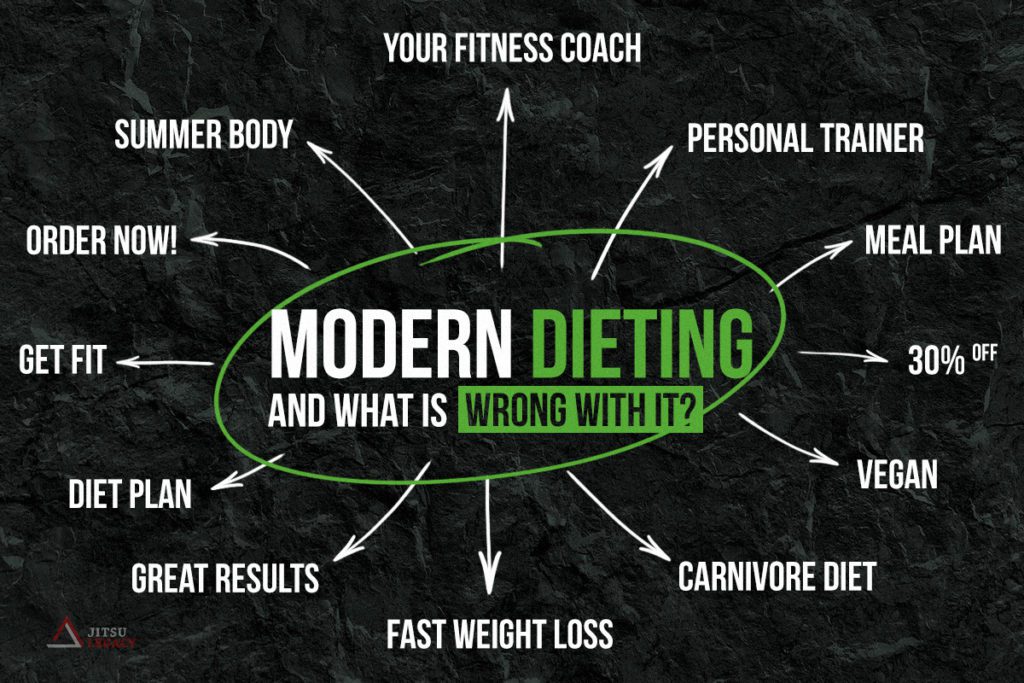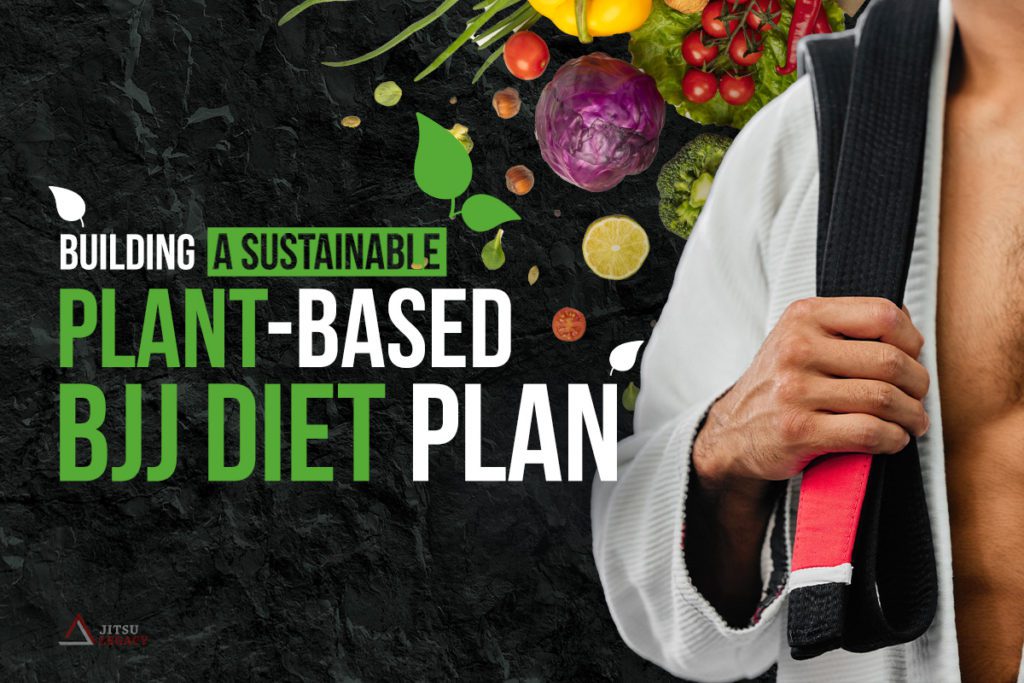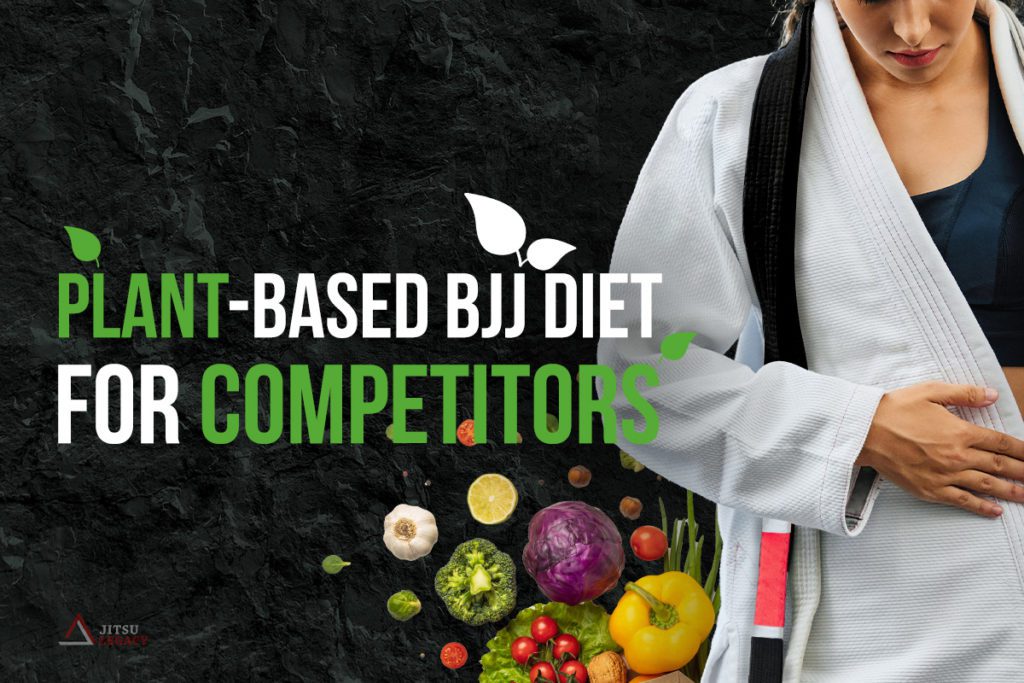Can you be a successful athlete and fulfill your full grappling potential if you are eating a plant-based BJJ diet? There are three schools of thought on the subject. One is the old school approach which says that without meat you can’t be an athlete. Another is the complete opposite, the modern view of claiming going vegan is the only thing in the world. There’s a third way, which is one based on the science of nutrition, research, and peer-reviewed studies. Let’s take this third approach and see how you can set up a great plant-based BJJ diet plan.
The Modern Pitfalls of Dieting

Nowadays, there’s dieting advice available left right, and center. Moreover, people are claiming to be experts in nutrition coming up with the most idiotic titles possible. I’ll shed the brutal light – there is no real school of nutrition that is recognized as such. Doctors and people that have studied biochemistry, chemical engineering, biology, etc. and go further into researching food and nutrition as part of their Ph.D. thesis.
But how do all these certified nutritionists get their certificates? Check out where the certificates are from. Most often they’re from brands (like the famous Dolce diet) that certify people based on their attendance of a course or seminar.
This does not mean they do not understand nutrition, but it does mean you should not trust them blindly. After all, you want someone with proper medical knowledge when you’re sick, rather than somebody who took a four-week crash course, right?
Now that this is out of the way, let’s talk about the glaring issues of coming up with a sustainable diet plan nowadays. First, there are too many distractions. Trying to live without eating a pizza or ice cream is no way to live in today’s society. In that sense, it is better if you indulge every once in a while, rather than trying to exist miserably by avoiding all processed foods.
Secondly, there’s too much information, with most of it being worthless. Every few months, something crazier and crazier hits the headlines of nutrition-based information portals. Going vegan quickly got replaced by the carnivore diet, which is the utter opposite. Keto died away, giving way to intermittent fasting, and I’ve seen everything from people saying eggs are bad for you, to others claiming you can live off bananas only.
There is always something that makes these diet plans compelling to look at, but that doesn’t make them sustainable, or the right choice for you.
The issues of not having anyone truly qualified, and everyone that has a keyboard having access to publishing things they think are true, are the reason why there is so much horrible diet advice out there.
Today, I’ll talk about restrictive diets (those that exclude some types of food) and in particular, whether you can avoid eating meat and live a healthy life, and have a successful athletic career. Without steroids, of course.
How to Eat When You Grapple
If you’re training BJJ, you already know that the demands of the sport are unlike most other things. Unless you’re also training in wrestling or MMA, you will not be physically ready for the demands of grappling. It won’t matter if you are a champion sprinter, or if you’ve been competing in Spartan races for the past 5 years. Nothing is going to prepare you for the demands of wrestling with another person for hours.
Specific conditioning training is a subject for another article. Fueling your training off the mats, before and after practice, is what I’ll focus on today.
When you’re grappling, you are engaging all three of your energy systems. Without taking a tangent in explaining them, let’s just look at what fuels each of them. The system responsible for bursts of energy that you can only sustain shortly requires amino acids and carbohydrates. In particular, it requires creatine and glucose.
The energy system that allows you to work for medium amounts of time (2-4 minutes, for example) needs glucose and other types o carbohydrates more than anything else. It usually draws that glucose from glycogen stored in the muscles.
Finally, the third energy system, the one that will allow you to go for hours but at a very slow and steady pace prefers glucose and carbohydrates, but can also run on at, and even convert protein into a power source if needed.
The bottom line to get energy for grappling, you will need specific amino acids and carbohydrates above anything else. Of course, for balanced nutrition, all macro and micronutrients are important, but focusing on getting ample and easily usable amounts of the above-mentioned will ensure you won’t run out of fuel in grappling.
That said, if you decide to skip meat when you’re setting up your BJJ diet plan, you can by all means o it in a safe, healthy, and sustainable manner.
A Sustainable Plant-Based BJJ Diet Plan

Eating a plant-based diet as an athlete, professional or not, is not a difficult task to achieve. All you need is to understand a few things, and especially, a few terms that often get thrown around.
A plant-based diet does not have to completely exclude meat, although it is often used in a sense that does. It may just mean that you’re only eating meat sporadically, or only eating certain amounts of meat. Not surprisingly, there are terms for everything.
A vegetarian is someone that does not eat meat but consumes other types of animal products, like dairy, eggs, and honey.
A pescatarian is a person who does not eat any type of meat other than fish and also eats all other animal products (dairy, eggs, honey).
A vegan is somebody who only eats food that is of non-animal origin. They avoid meat, eggs, dairy, and sometimes even honey.
These three are the most commonly used terms when it comes to describing people that eat plant-based diets.
Now, let’s focus on breaking down what a sustainable plant-based BJJ diet should look like.
Can You Make It?
The answer is yes, you will stay alive if you decide not to eat mat. For the purposes of this article, any time I write plant-based, I refer to vegetarian.
As long as you eat eggs and dairy, you are ingesting everything you need for a well-balanced diet. If you are also careful about your overall food choices and are serious about balancing your diet, you can get everything your body needs from a plant-based BJJ diet.
Moreover, you can use such a diet to go up or down a weight class in a safe and healthy way, if you choose to do so. Not consuming meat will not impact any aspect of your normal life, as long as you don’t skip animal products entirely.
What Do You Need?
The main things we are looking to get from any diet are proteins, carbohydrates, and fat. Those are known as macronutrients. Proteins are the building blocks for the body, carbohydrates are the body’s preferred energy source and fats are building blocks of hormones as well as a means of storing potential energy-releasing materials.
Apart from the macronutrients, you also need micronutrients in the shape of minerals and vitamins. They help fine-tune many key functions of the body and regulate day-to-day activity.
Most of the macro and micronutrients our bodies need we get from food. Our bodies are only capable of synthesizing limited amounts of just several things we need to survive on their own, and even those are based on ingesting sustenance.
What’s missing?
When people decide to do a restrictive diet, they decide to completely stop eating a specific type of food, or a certain category of food altogether. As long as you don’t try to give up on a major macronutrient (yes, I do think keto is dumb) you will be fine in general. Micronutrients are where things get tricky.
Avoiding meat, means you will get less of certain types of amino acids. All protein is built of amino acids. There are 40 amino acids our bodies need to function optimally, 20 of which are called essential and 20 non-essential.
The protein in meat is made out of all the essential amino acids and some non-essential ones. Food of non-animal origin does not contain all the essential amino acids a human needs.
The twist here is vegetarianism vs. veganism. As long as you eat animal products in the form of eggs and dairy, you will get all the essential amino acids you need. It is also why going full vegan is a stupid and potentially health-hazardous thing to do.
From a micronutrient standpoint, animal products contain vitamins that are impossible to get from plant sources either at all or in the required quantities. A big one is B12, which among other things, helps with oxygen transportation and is an essential building block for certain crucial elements in our blood.
In short, if you skip on every food of animal origin, you will be missing key amino acids and micronutrients which you can’t replace fully even with supplements.
Macronutrient Balancing
As an athlete, you’ve probably sought out information on how many macronutrients you need per day. And, unless you’re a medical professional or a biochemist yourself, you probably ran into some quick information you took for granted. Well, most of it is wrong, and yes, that includes recommendations from official institutions.
The reason is simple – macronutrient requirements are a very individual thing. You need to take into consideration your age, sex, activity, weight, athletic goals, medical history, etc. There are formulas by which you can easily calculate this precisely, but I’ll not provide them here/ Why? Because you will need to recalculate every couple of weeks and adjust for the changes in your body and or daily habits. That is too much math to do for food.
Simply put, you need less protein than you think, more fat than you think, and fewer carbohydrates than you are consuming.
The idea is to have most of your nutrients in the carbohydrate part of your meal, especially if you are an athlete. Eating most of your carbs in the morning, before and after training is a great way to ensure a sustainable healthy, and enjoyable BJJ diet plan.
Moreover, try to have protein with every meal, and in a plant-based BJJ diet, be certain that at least one of your meals has animal products in it.
When it comes to fat, all you need is to make the right food choices, and you’ll get all the fat you need.
A Word on Food Choices
It is important to understand that food choices matter as much as macronutrient balancing or picking a restrictive diet. No amount of calculations can make up for a diet that consists of processed fast food, simply because of one thing – the conversion of nutrients.
Namely, any scarce nutrients in fast food are either difficult or impossible for the body to extract. Eating whole foods means your body will be able to get the most out of everything you ingest. Moreover, your digestive system will not be overworked.
Anything that is fresh (fruit and veggies), nuts, eggs, cheese, cream cheese, sour cream, all types of legumes, mushrooms, tofu, seitan, etc. are all great sources of nutrition for a plant-based BJJ diet plan.
What you have to keep in mind is that not all food sources have as much protein as you are led to believe. Apart from meat and eggs, most other products contain little protein. Beans and chickpeas, as well as soy products, are high on the list of protein-rich plant-based foods. Mushrooms, peas, and stuff like that, on the other hand, are basically worthless protein-wise.
Food choices matter not just in terms of processed vs unprocessed but also from a macronutrient balancing standpoint. If you want your plant-based diet to help fuel your athletic endeavors, particularly in terms of grappling, you need to make sure you have balance.
Sticking to the rule of eating animal products with at least one of your meals is more than enough. That said, supplementing with whey protein is also never a bad idea when you’re on a plant-based BJJ diet.
Plant-Based BJJ Diet for Competitors

Competing in BJJ means that you will need to fall within a weight class. For those that have no trouble in that department, doing changes in your BJJ diet plan won’t affect you much, unless those changes are huge.
Those that cut weight, on the other hand, need to make sure they do it in a healthy manner, especially when eating a plant-based diet. When cutting, people usually go towards protein and cut down on carbs, while also manipulating water. This is a good way to cut weight, but it becomes tricky to figure out when you’re not eating meat.
Given the near-perfect natural composition of eggs, they will become your best friend when it comes to cutting weight on a plant-based BJJ diet. Eating them whole will ensure you get everything from a protein and fat standpoint, with some key minerals as well. Nuts and seeds are going to be your second-best option, combined with lots of veggies, and the occasional fruits in and around training.
Stay off the legumes when you’re cutting, despite your love for beans, lentils, and chickpeas. They do contain lots of starch and carbs in addition to proteins, and they also tend to have a bloating effect.
Also, be mindful of cheese. Cottage cheese and Greek yogurt should be the only things you reach for during a weight cut. Any fatty types of cheese, cream cheese, and the likes can wait until you’re done competing. Oh, and stay away from soy products (tofu, tempeh, etc.) while cutting down.
In Summary
Eating a plant-based diet, for reasons known to yourself only, can be a healthy and sustainable choice. You can easily balance the diet to get everything you need for daily life and all the rigors of grappling training, You just need to understand what a plant-based diet delivers, and how to tweak it a bit in order to get the most out of the food you are eating. That said, eating plant-based is going to expose you to some flavor combinations you’d have never thought possible when eating meat. Just saying.

Ogi is a black belt that does Jiu Jitsu full time and is very passionate about anything grappling-related.
He is also the head coach of Enso Jiu Jitsu in Macedonia and an aspiring Globetrotter.
